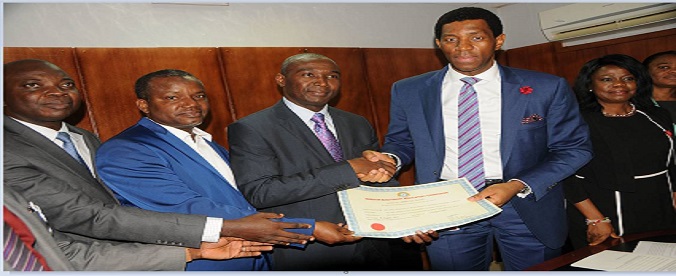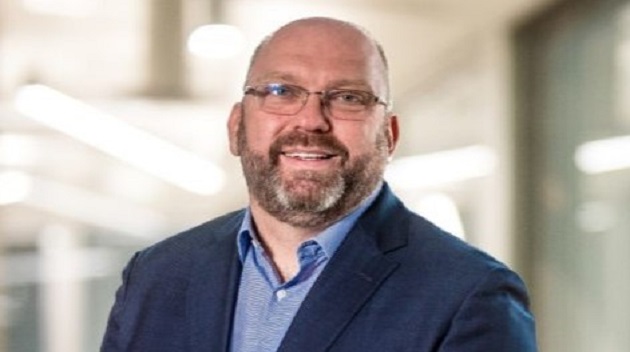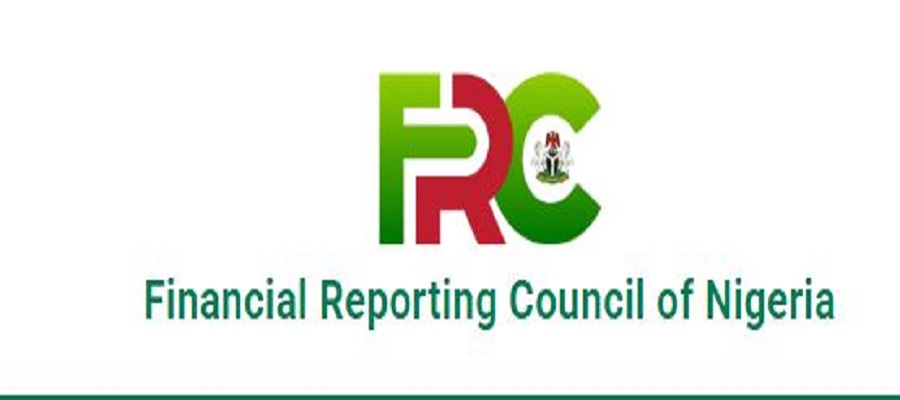General News
SPDC JV’s Afam VI Power Plant Secures Licence for another 10 Years

Nigeria Electricity Regulatory Commission (NERC) has renewed the power generation licence for Afam VI Power Plant, a 650MW-capacity facility that has delivered over 24.16 million Megawatt-hour (MWh) of electricity into the Nigerian grid between inception in 2008 and 2016.
Afam VI is owned by The Shell Petroleum Development Company Joint Venture (SPDC JV) and located in Okoloma in Oyigbo Local Government area of Rivers State.
Presenting the renewed licence to the leadership of SPDC at the Commission’s office in Abuja on Tuesday, Mr. Dafe Akpeneye, commissioner, Legal, Licensing and Compliance, described SPDC JV as a committed partner in the Nigerian power sector adding that the company’s belief in the sector and its resolve to help it develop were remarkable.
“We hope for greater efficiency and improved operations from Afam VI in the next 10-year phase of your operations just as we look forward to working together to resolve some of the challenging issues in the power sector,” he said.
Receiving the licence, Dr. Philip Mshelbila, general manager, Gas of SPDC, described the Afam VI as a model worthy of emulation by government and other players in the power sector. “Here’s a power plant with a dedicated gas plant operating with high uptime generating clean and efficient power from the combined cycle of three gas and one steam turbines.”
He lamented the challenges of debt, power evacuation and off-take which he said prevented the plant from delivering optimally at 15 percent of the total national grid-connected electricity.
Afam VI uses combined cycle gas turbine technology that burns 40 percent less gas than plants using older open cycle technologies. This also contributes significantly to the reduction of greenhouse gas emissions. In 2016, Afam VI power plant supplied approximately 12% of the nation’s grid-electricity.
Built with the most efficient technology in the industry and utilising waste heat energy from the gas turbine exhaust, the plant generates an additional 200MW from the steam turbine without consuming any additional gas, thereby considerably reducing its carbon footprint.
As a Clean Development Mechanism (CDM) project under the United Nations Executive Board for Climate Change, Afam VI Power Plant eliminates over 500,000 tons of CO2 emissions per year, while also maintaining excellent safety standards.
The operations at Afam VI have generated subcontract opportunities and employment for over 150 staff from the 16 host communities.
It also provided hands-on and offshore training for 15 youths in Electrical, Mechanical and Instrumentation engineering on Combined Cycle Power Plant operations and maintenance. All the trainees are already employed in the Nigerian power industry. Arrangements have been concluded for the training of another 15 community youths.
The power plant also won SPDC the Best Company in Climate Action Award in the 2016 edition of Sustainability, Enterprise, Responsibility Awards for Corporate Social Responsibility (SERAs–CSR), an annual event to celebrate organisations that invest resources to improve the socioeconomic living conditions of people in Nigeria and Africa.
===
General News
NCS to Launch Electronic System for Cash Declarations at Airports

Nigeria Customs Service (NCS) is set to introduce an electronic declaration system to streamline and enhance compliance for travelers carrying cash into or out of Nigeria.

Speaking in an interview with the News Agency of Nigeria (NAN) in Abuja, Abdullahi Maiwada, NCS spokesperson, emphasized that the initiative aligns with efforts to strengthen Nigeria’s anti-money laundering framework and reinforce financial regulations.
“The Nigeria Customs Service (NCS) has announced the deployment of an Electronic-Currency (E-Currency) declaration form as part of its anti-money laundering measures for travelers carrying cash into and out of Nigeria,” NAN reported. The system will require travelers carrying amounts exceeding the legal threshold to declare them before arrival or departure.
Maiwada further explained the process, stating, “We have developed a system where, even before leaving your point of origin, you can scan a QR code, access the form, fill it out, and we will be able to see it from here.”
He noted that the initiative, set for rollout soon, will enhance monitoring and facilitate information sharing with relevant authorities.
Under the Anti-Money Laundering (Prevention and Prohibition) Act 2022 and the NCS Act 2023, travelers carrying over $10,000 (about N15.4 million) or its equivalent in negotiable instruments must declare the funds to Customs authorities.
To boost awareness, the NCS is working with airline operators to inform travelers through onboard announcements and plans to reinstate signage at airports and border points in English and French.
The move comes as part of broader efforts to tighten financial controls following a recent case at the Murtala Muhammed International Airport (MMIA), where Customs officials seized $578,000 from a passenger attempting to evade currency declaration regulations.
General News
Aquaterra Energy Secures Multi-million-dollar well Intervention Contract with Intrepid Energy in Nigeria

Aquaterra Energy, a leader in offshore engineering solutions, has secured a multi-million-dollar, multi-year contract with Intrepid Energy Limited (IEL) to deliver a bespoke subsea well intervention equipment package for a project in Nigeria.

Aquaterra Energy’s turnkey well access package will enable IEL to conduct intervention operations across multiple mature oil wells in the region, supporting enhanced reservoir production.
The contract includes the supply of a complete seabed-to-surface intervention system and package, spanning from the subsea tree to surface intervention equipment.
Key components include Aquaterra Energy’s TRT tieback tooling, which provides production bore and annular access, a lightweight well pressure control system, and an ISO 13628-7 qualified open water intervention riser with an integrated tensioning system. In addition to equipment provision, Aquaterra Energy will also deliver ongoing offshore engineering support throughout the project.
The 7- 3/8” lightweight well access solution, has been specifically engineered for deployment from jack-ups and lift boats. This innovative approach offers a cost-effective and operationally efficient alternative to floating vessels, reducing intervention costs while maintaining high safety and performance standards.
Andrew McDowell, Delivery Director at Aquaterra Energy comments: “Our expertise in offshore engineering allows us to develop tailored intervention solutions that address the operational challenges of subsea well access.
This system has been engineered for efficiency, ease of deployment, and safety, helping IEL optimise intervention activities across Nigeria while reducing costs. By delivering a complete, integrated package, we are simplifying complex operations and enabling operators to maximise production potential.”
Engr Seun Alonge, CEO at Intrepid Energy Limited adds: “Working with Aquaterra Energy marks a significant step forward for our intervention operations in Nigeria. Their specialised technology enhances our ability to execute intervention programmes efficiently, maximising performance across our assets.
By combining Aquaterra’s technical expertise with our deep understanding of the local operating environment, we’re confident this collaboration will enhance production outcomes and create lasting value for our operations in the region.”
The project is set to support intervention operations over multiple years, with Aquaterra Energy providing ongoing technical expertise, with a dedicated team of engineers providing ongoing service support throughout the project.
George Morrison, CEO at Aquaterra Energy: “Delivering reliable and efficient well access solutions for shallow water subsea operations is central to how we support offshore operators.
This collaboration with IEL reinforces our commitment to providing cutting-edge engineering solutions that enhance efficiency and reduce operational costs. With West Africa playing an important role in the global energy sector, we’re proud to continue supporting its offshore industry with our expertise and innovative technologies.”
General News
FG Halts Controversial FRC Dues amid Industry Outcry

Federal government has temporarily suspended the controversial annual dues imposed on public interest enterprises by the Financial Reporting Council (FRC) after fierce opposition from businesses.

Jumoke Oduwole, minister, Industry, Trade, and Investment, announced the decision during a Ministerial Consultative Meeting in Abuja on Wednesday.
The move follows mounting pressure from private sector groups, including the Nigeria Employers’ Consultative Association (NECA) and the Manufacturers Association of Nigeria (MAN), who slammed the Financial Reporting Council (Amendment) Act 2023 for burdening companies with excessive fees.
The Act mandates cumulative annual charges for non-listed entities and imposes a harsh 10% monthly penalty on unpaid dues, compounding until full payment, a provision that sparked widespread backlash.
At the meeting, major industry players like NECA, MAN, the Nigerian Association of Chambers of Commerce (NACCIMA), oil producers, and telecom operators warned that the fees would cripple businesses already struggling in a tough economy.
Oduwole clarified the suspension, stating, “The government has decided to direct the Financial Reporting Council to pause in the implementation of the new annual dues. You know that I am a lawyer, and a suspension request by the organised private sector would be in contravention of legislation duly passed by the National Assembly. A pause is an administrative process simply to review, in line with what we discussed today.”
She assured stakeholders that the halt would last no longer than 60 days, with a technical working group—including FRC officials and private sector representatives—set up to reassess the policy.
“We are a listening administration. The private sector has requested a range from three months to an indefinite suspension. We are not going to do that. So, at the most, 60 days is in my estimate. We are going to set up a technical working group comprised of the FRC and the organised private sector who have formally written in, and this will be reviewed,” Oduwole emphasized.

 Telecom3 days ago
Telecom3 days agoAgain, Labour Fumes, Threatens Shutdown of Telcos over Non-Implementation of 15 Percent Tariff Reduction

 News3 days ago
News3 days agoNNPC Ready to Go to Capital Market for IPO- CFIO

 E-Business3 days ago
E-Business3 days agoFG Launches Online Visa Approval Centre

 E-Business3 days ago
E-Business3 days agoQNET Disassociates From Fraudulent Academy in Abuja, Supports EFCC Arrest

 Telecom2 days ago
Telecom2 days agoIHS Nigeria Hosts Telecom Industry Stakeholders to Discuss Protection of Critical National Infrastructure in Lagos State

 E-Financial2 days ago
E-Financial2 days agoTitan Trust Bank Selects Oracle FSS for Core and Digital Banking Technology

 General News2 days ago
General News2 days agoNCS to Launch Electronic System for Cash Declarations at Airports

 News2 days ago
News2 days agoSanwo-Olu Hails Jumia for Giant Strides in Growing Nigeria’s E-Commerce Sector












